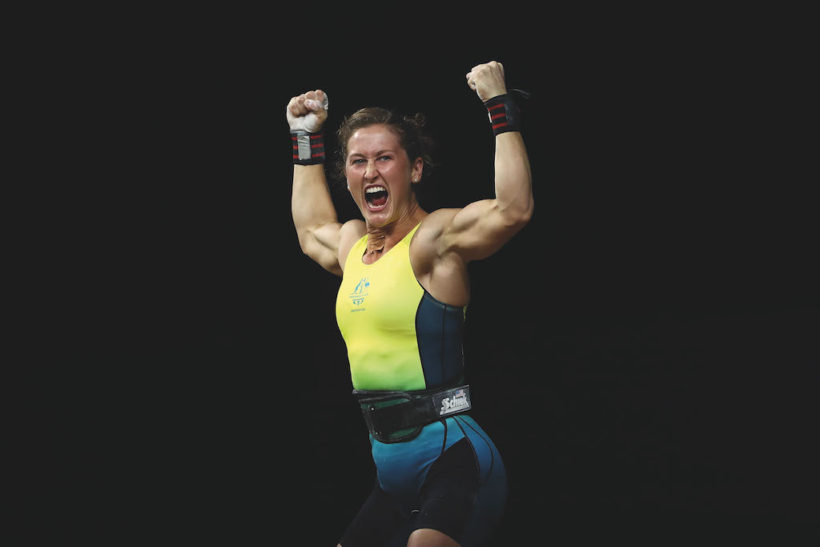From a CrossFit legend to the greatest gymnast ever, these astonishing female athletes have redefined what’s possible…
Men’s Fitness, for obvious reasons, has always championed male athletes at the pinnacles of their sports.
But just as we can learn from the men at the top of their games, we can gain equal inspiration and insight from the elite women paving the way in their respective disciplines.
Not that long ago, it was a tall order to watch the best female athletes on the planet on TV outside of a tennis Grand Slam or a major athletics championship. Now, women’s sport is everywhere – and about time, too.
The sea change seems to have come – to borrow Hemingway’s phrase – “gradually, then suddenly.” After generations of women playing second fiddle in the billing and on the payroll, the last few years have seen an explosion of interest, of commercial backing, and of talent to match.
Everywhere, female athletes are pushing boundaries, fighting for equality and representation, and not taking no for an answer. They are smashing records, breaking through barriers, and sometimes even beating the men in their own games.
For the first time at the Tokyo Olympics, Team GB sent more women than men – 201 to 175. And the sporting image of the summer was surely 18-year-old Emma Raducanu collapsing to the ground in disbelief, after catapulting herself from qualifier to global superstar by winning the US Open.
Or perhaps it was cyclist Laura Kenny, head down in determination on her way to becoming the UK’s most successful ever Olympian. Either way, one thing is clear: women’s sport is on the march.
Here are just ten of the incredible game changing (and game winning) female athletes to watch more of…
10 Awe-Inspiring Female Athletes
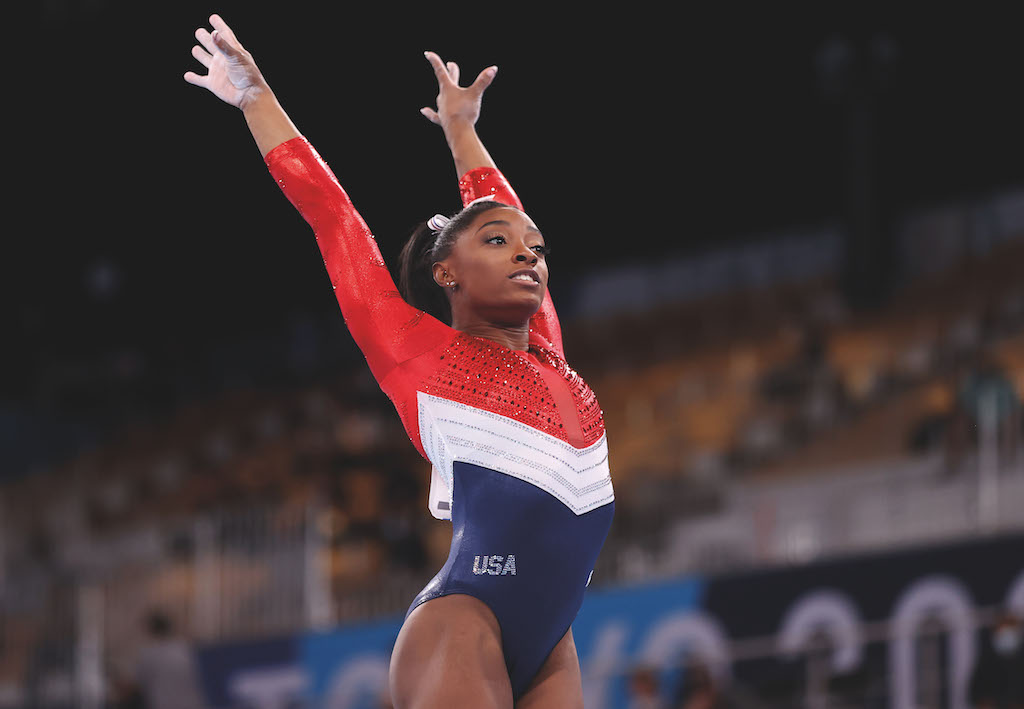
Simone Biles competes on vault during the Women’s Team Final on day four of the Tokyo 2020 Olympic Games | Photography: Laurence Griffiths/Getty Images
Simone Biles
To call Biles a gymnast is like describing Da Vinci as a dabbler. Her artistry and dominance are supreme. She has 32 Olympic and World Championship medals. Watching her tumble is enough to make you conclude that Isaac Newton got gravity all wrong. She is undisputably the greatest gymnast – male or female – of all time. But she’s also much more than that.
When, during the Tokyo Olympics, she got a case of the ‘twisties’ – gymnast speak for losing spatial awareness during a routine – she also ignited a global conversation about athletes and mental health.
“I feel like it’s hard,” she said, “but it’s harder being a female athlete because everybody prays for your downfall and wants you to mess up. At the end of the day, we’re not just athletes or entertainment. We’re human, too.”
While much of the response was positive, inevitably some called her ‘weak’ or a quitter. And yet this is a woman who has been through a lot worse than just missing out on another podium.
In 2018, she revealed on social media that she – along with teammates – was sexually abused by former USA Gymnastics team doctor Larry Nassar, now in prison for life. She’s since given powerful testimony before the Senate, which is examining the FBI’s investigation into Nassar. Biles has become a voice speaking up for abused women everywhere.
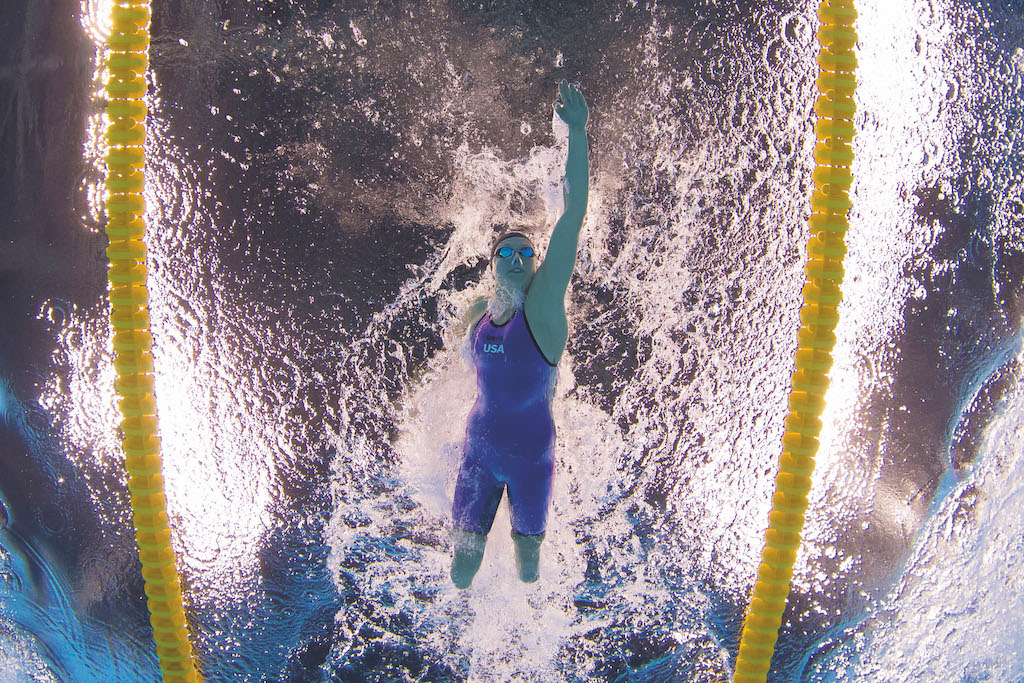
Jessica Long competes in the Women’s 400m Freestyle S8 final on day 1 of the Rio 2016 Paralympic Games | Photography: Buda Mendes/Getty Images
Jessica Long
An ad during the NFL Superbowl costs $5.5 million. So when Toyota made their 30-second slot a mini filmic biography
of swimmer Jessica Long, it made quite a statement – one she absolutely deserved.
Now one of the most decorated Paralympians in history, her start to life was less than promising. Born with fibular hemimelia, she lacked most of the bones in her feet and had to have both legs amputated. Her 16-year-old mother, fearing she lacked the resources to care for her, was persuaded to put her in an orphanage. She was adopted by a couple in the US, and as a toddler underwent the first of 25 surgeries.
Though her childhood was difficult – she has described it as “hard and painful” – her adoptive parents always encouraged her to try sports, from gymnastics to ice skating, via rock climbing and trampolining. But it was in the water that she found her catharsis. From pretending to be a mermaid in her grandparents’ pool, she made her Paralympic debut at just 12 and has gone on to win no less than 29 medals.
“If your dream seems impossible: perfect,” she says. “You’re on the right track”.
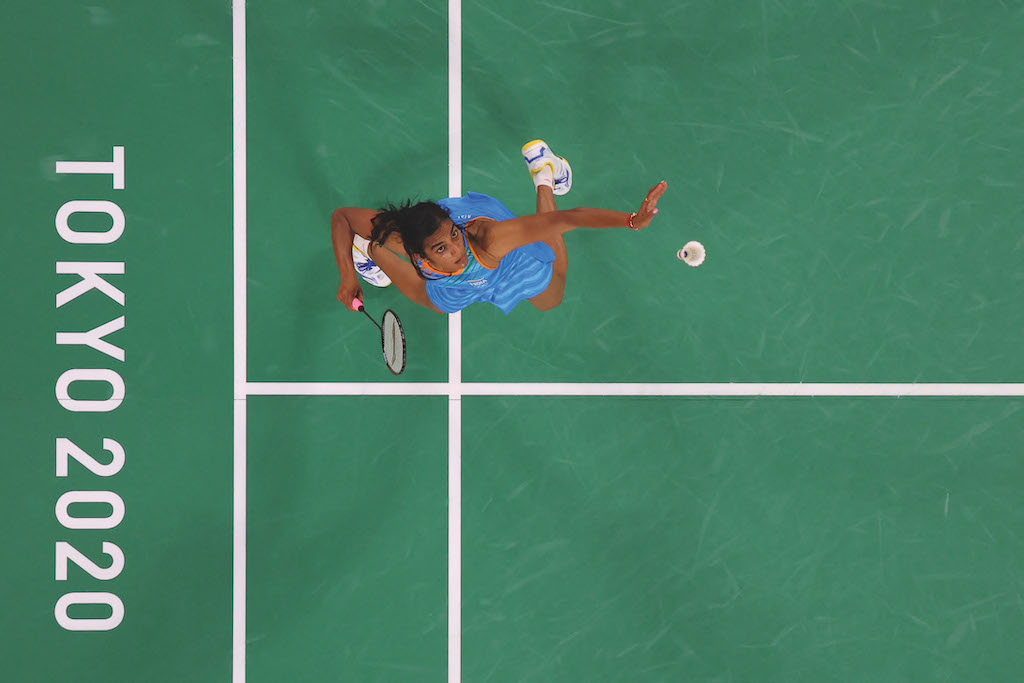
India’s P. V. Sindhu hits a shot to China’s He Bingjiao in their women’s singles badminton bronze medal match at Tokyo 2020 | Photography: Lintao Zhang/Getty Images
P.V. Sindhu
Badminton might not be primetime viewing in the UK, but then how many female athletes here can boast close to six-million followers and a regular spot on Forbes’ list of the highest-paid female athletes in the world?
Pusarla Venkata Sindhu became a household name in India in 2016, when she won a silver medal at the Rio Olympics – the first Indian woman ever to do so in any discipline. She’s since won medals at multiple tournaments, including the world championships, become the first Indian to become badminton World Champion, and only the second athlete from India ever to win two Olympic medals.
When you consider that it was only in 2000 that an Indian woman won any Olympic medal at all, it’s quite a trajectory. She’s been showered with accolades and awards in India. But more importantly, shown millions of young Indian girls that there is a place in sport for them, too.
“Before I started it was more like, ‘Girls shouldn’t come out and play sport. You need to stay at home’,” she told CNN. “But in a few years, it has changed.” She is a big reason why.
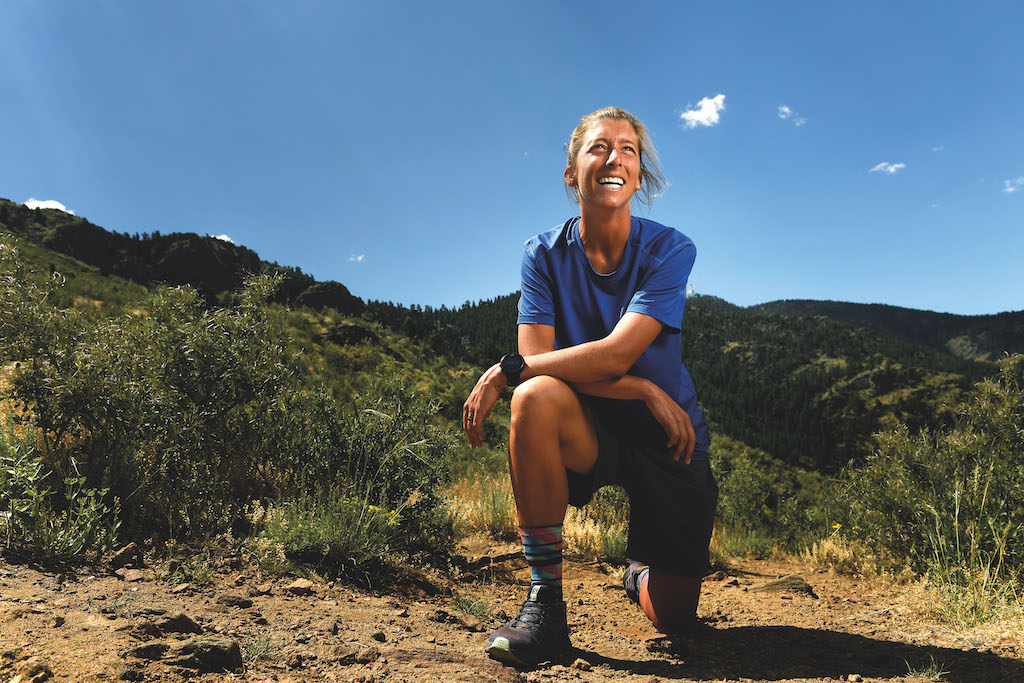
Portrait of Courtney Dauwalter, winner of the 2018 Western States 100-Mile Endurance Run | Photography: Joe Amon/The Denver Post via Getty Images
Courtney Dauwalter
It’s hard to believe that it was only a decade before Courtney Dauwalter was born that women were first allowed to compete in marathons. Now she’s redefining not just what female athletes can do in ultra-running, but what humans can achieve. She’s won some of the biggest races, and beaten men to the finish line in the process.
An all-rounder at school, she went to college on a cross-country skiing scholarship and then worked as a full-time teacher, only turning professional in 2017 – a year after she won the 100-mile Run Rabbbit Run 75 minutes ahead of the second placer.
She tells jokes during races to see if her mind is still working, runs light but always carries a toothbrush, and doesn’t follow a training plan or diet. Instead, she eats whatever her body tells her it wants. And it’s led her to course records galore, as well as wins at the most prestigous ultra races. This includes the Ultra-Trail du Mont-Blanc (UTMB) and the Western States.
In 2020, Dauwalter even set a record for the longest distance run non-stop by a woman: 283.3 miles in just under 57 hours at Big’s Backyard Ultra. Oh, and she won that outright, too. Some say she’s the best ultra-runner on the planet, and it’s hard to disagree.
View this post on Instagram
Tia-Clair Toomey
She only took up CrossFit in 2013, but the Australian powerhouse has gone on to absolutely dominate the women’s event, with five consecutive championship wins. In-between those CrossFit triumphs, she’s mastered Olympic weightlifting, too: representing Australia at the Rio Games, where she snatched 82kg and clean-and-jerked 107kg to finish 14th. She followed that up with gold at the 2018 Commonwealth Games.
To her 1.7 million Instagram followers, she’s a source of advice and inspiration. However, she’s far from satisfied to rest on her laurels. She trains more in a day than most people do in a week.
Even her off-season is hardcore: in 2020, she announced she would train with the Australian bobsleigh team, with a view to qualifying for the 2022 Winter Olympics in Beijing. That would make her the first CrossFit athlete to compete in both the Summer and Winter Olympics.
But before her rivals rejoice and start daydreaming of her top spot on the podium, she’s made it clear she’ll be back competing in CrossFit again after the Winter Olympics are done.
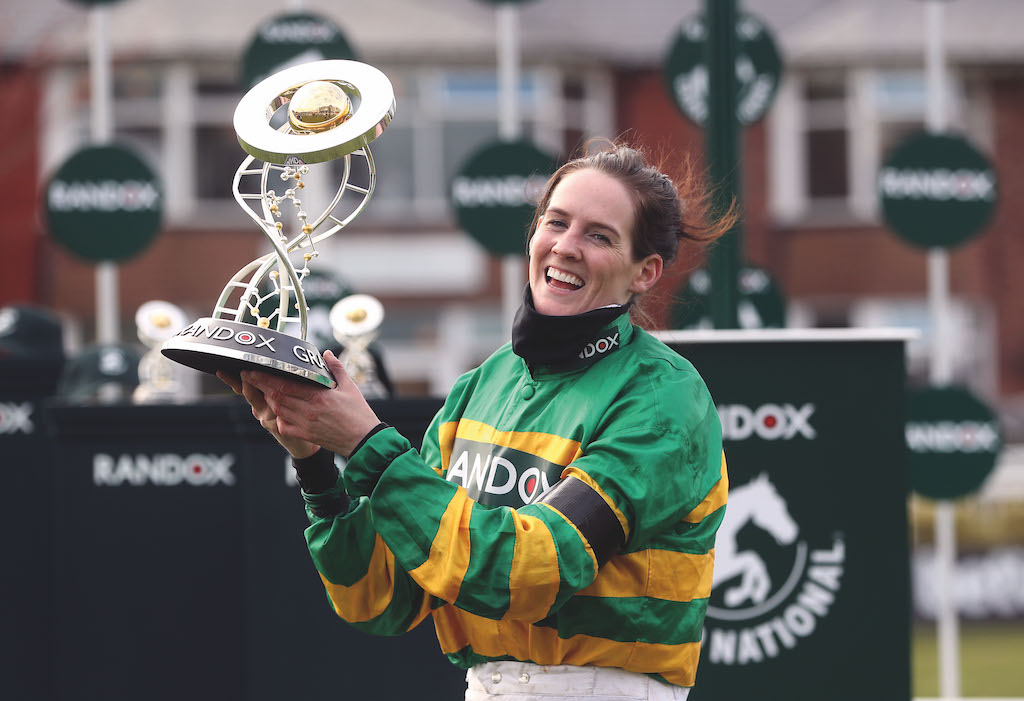
Jockey Rachael Blackmore receives the Randox Grand National Handicap Chase trophy after winning on Minella Times in 2021 | Photography: David Davies/Getty Images
Rachael Blackmore
It’s the stuff of Hollywood biopics: female jockey takes on the men at their own game, and wins the biggest and toughest race in the world. When Rachael Blackmore became the first woman to win the Grand National, she broke one of the greatest gender barriers in sport. Though female jockeys have been allowed to enter the event (which started in 1839) since 1975, Blackmore was still only the 20th to compete. It was a truly incredible moment.
Daughter of a dairy farmer and a school teacher, Blackmore grew up riding ponies. However, she never dreamed of a career in racing, instead thinking she would be a vet. She only went professional in 2015.
“I was a bit taken aback,” she says, “because it’s just not something that I thought I could do. I didn’t feel I was good enough to do it.”
2021 proved that comprehensively wrong, when she won not just the National, but was leading jockey at Cheltenham to boot. She prefers not to dwell on questions of gender, avoids the limelight, and cracks on quietly and without fuss. But it’s hard not to imagine a new generation of young girls and boys watching her ride, and dreaming big.
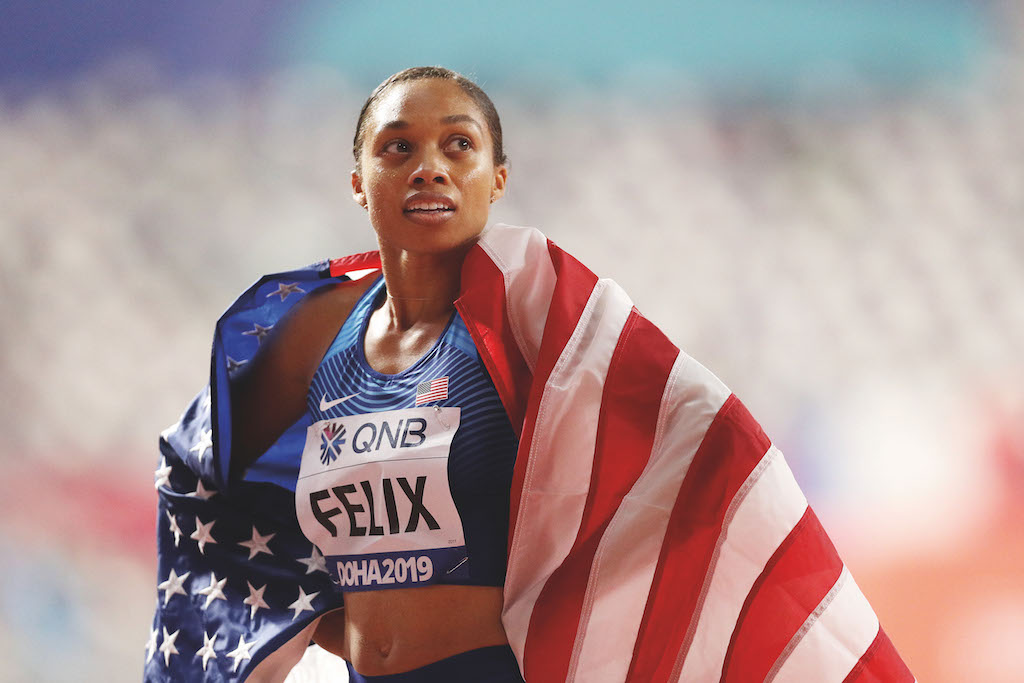
Allyson Felix reacts after setting a new world record in the 4x400m Mixed Relay at the World Athletics Championships in 2019 | Photography: Patrick Smith/Getty Images
Allyson Felix
Listing Alyson Felix’s athletic achievements takes longer than it does for her to sprint to victory: she was the first track and field athlete ever to win seven Olympic golds, the most decorated woman in track and field history, and now has a total of 11 medals from five consecutive Olympic games.
And that’s just the edited highlights. From debuting on the international scene in 2003 at the age of 17, she has been the dictionary-definition of excellence, performing without fuss or fury.
But if her graceful efficiency on the track belies her determination, it is off the track that she has found her voice. During a difficult pregnancy in 2018/9, Felix developed pre-eclampsia – a condition which disproportionately affects African American women. After a terrifying emergency C-Section, Felix testified before the United States House Committee on Ways and Means on the black maternal mortality crisis, and on racial bias in the healthcare system.
If that didn’t provoke as many headlines – or actions – as it should have, she then caused more waves in May 2019, when she wrote an article in the New York Times accusing Nike – her long-time sponsor – of letting down female athletes by refusing to pay them during or after pregnancy. The controversy, and her words, led directly to Nike changing their maternal policy. Felix is not just a front runner among female athletes, but a true leader.
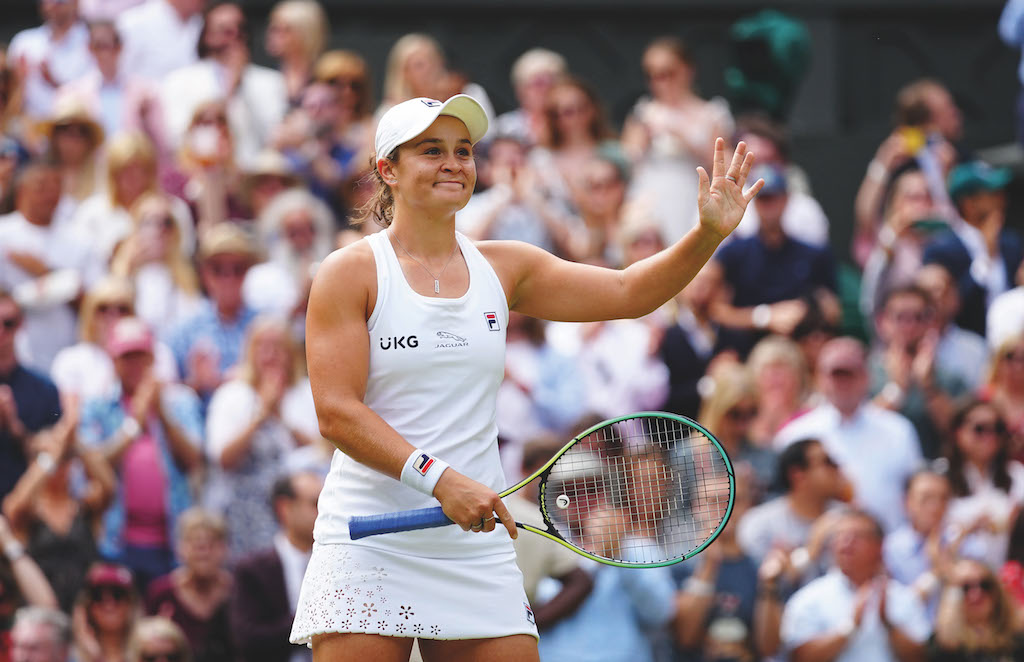
Ashleigh Barty celebrates after winning her semi-final match against Angelique Kerber at Wimbledon 2021 | Photography: Mike Hewitt/Getty Images
Ashleigh Barty
It’s a strange thing, but the world’s best women’s tennis player often seems to fly under the radar. Perhaps it’s because Ashleigh Barty is so modest and down to earth. Or, perhaps it’s because she lacks the fiery tempers and big-name contracts of some of her rivals.
Barty is of indigenous Australian heritage, fiercely proud of her Ngarigo background, and backs programmes to help the development of young indigenous players. She knows full well how important that is: she’s devoted to her own mentor and inspiration, the great Yvonne Goolagong. Barty was the first Australian woman to win Wimbledon since Goolagong thrashed Chris Evert back in 1980.
And yet back in 2014, after early success, including winning Junior Wimbledon, Barty was fed up, lonely and depressed. “I kind of lost my way a little bit,” she recalls. She quit tennis and spent two years playing cricket in Australia’s Big Bash League – all with the approval of Goolagong who texted her, “Hey Darl. Good decision. Go wet a line.”
And that break was clearly exactly what she needed, because since returning in 2016 she’s risen steadily to the top. Even when she loses – though that’s rare enough – she maintains her composure. As she says, “The sun will rise again tomorrow.”
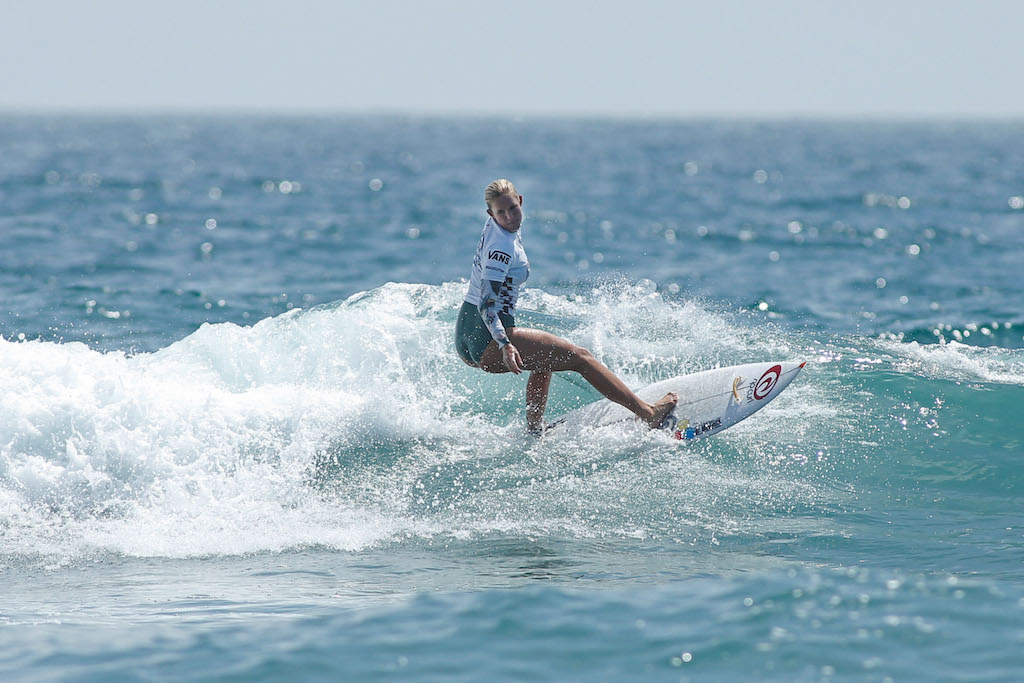
Bethany Hamilton competes in the 2019 VANS US Open of Surfing in 2019 | Photography: Katharine Lotze/Getty Images
Bethany Hamilton
She learned to surf at the grand old age of three, was winning competitions by eight and signed her first sponsorship deal at nine. And then, aged 13, Hamilton’s story changed dramatically.
On a sunny morning in Hawaii, paddling through the surf with her best friend, a shark attacked and ripped off her left arm. By the time she got to hospital, she had lost over 60% of her blood. But she survived and, astonishingly, was back on her board less than a month later.
It’s that courage and tenacity – and refusal to quit what she loved – that has made Hamilton a sporting icon and role model. She taught herself to surf with one arm, initially using a custom-made board. Then, she was back in competition within months and won a national championships a year later.
Since then, she has gone pro; ridden some truly terrifying waves; fought for women’s place in a sport dominated by men; published a children’s book and an autobiography; launched a lifestyle app; featured in documentaries and a feature-length film; and raised money for children living in poverty.
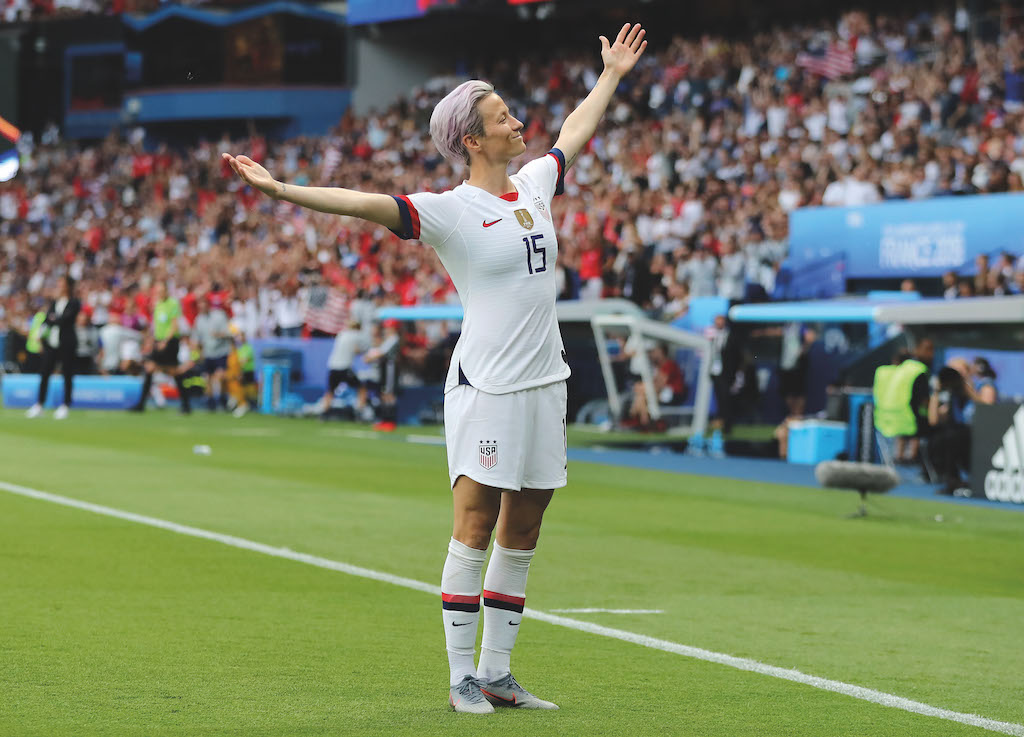
Megan Rapinoe celebrates after scoring USA’s first goal during the 2019 FIFA Women’s World Cup Quarter Final match against France | Photography: Elsa/Getty Images
Megan Rapinoe
The instantly recognisable pink-haired winger won the Balon D’Or for best female player in the world in 2019, and has two World Cups and an Olympic gold medal to her name. Yet her greatest legacy might be off the pitch: she also fights, uncompromisingly, for what she believes in, leveraging her influence to bring about positive change.
In 2016, she took the knee during the US national anthem in solidarity with the NFL’s Colin Kaepernick. She’s an advocate for numerous LGBT organisations. She has also joined leading athletes in petitioning the US Supreme Court to protect abortion rights. In 2019 she irked President Trump after saying on camera she wouldn’t visit the White House if the team won the World Cup. She should “finish the job” before she talks, he wrote on Twitter. Six goals, a Golden Boot and another World Cup later, she did just that.
Rapinoe has also long spoken out for equal pay, joining others in filing a lawsuit against the US Soccer Federation alleging pay discrimination. It’s a fight she, and her teammates, have just won.
“I feel like honestly we’ve done everything,” she said. “You want stadiums filled? We filled them. You want role models for your kids, for your boys, and your girls, and your little trans kids? We have that.”
Words: Kate Carter

